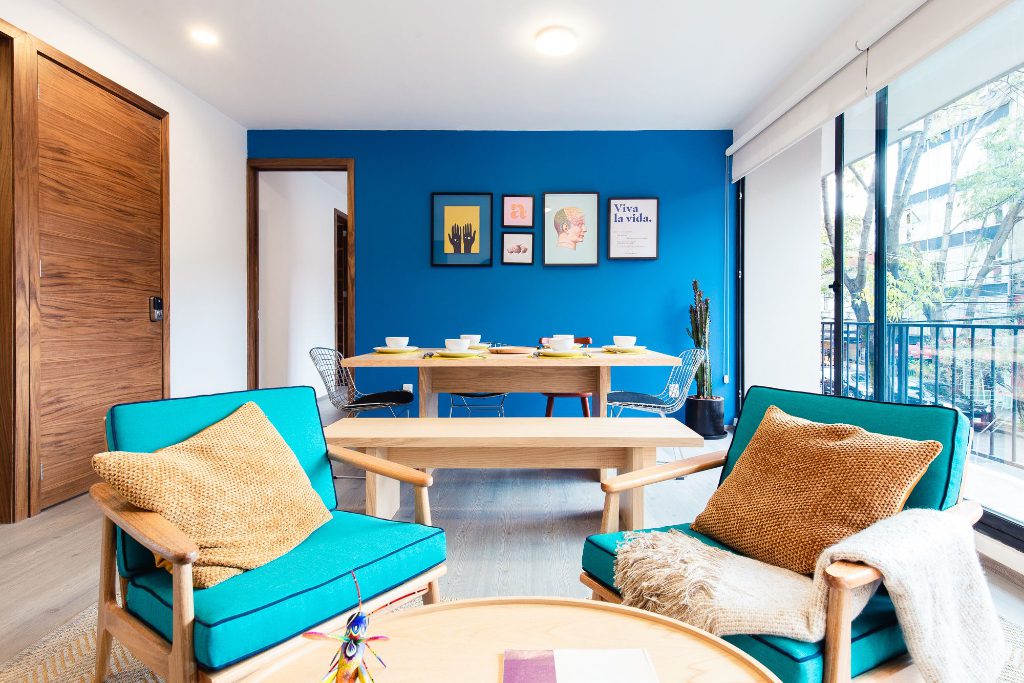Skift Take
Venture capitalists rarely bet on Mexico's travel startups. But Casai's 80 percent average occupancy rates in August and September must've helped it woo top-tier investor Andreessen Horowitz.
Casai, a short-term rental brand offering travelers professionalized stays with hotel-style amenities in Mexico, said Wednesday it had raised $23 million in equity funding.
Andreessen Horowitz, a venture-capital firm that was an early backer of Airbnb and Facebook, led the round. Kaszek Ventures, arguably Latin America’s largest venture fund, also participated. Other backers included Global Founders Capital.
Casai said it had also accessed as much as $25 million in debt financing from TriplePoint Capital, bringing the funding total to $48 million.
The startup runs about 200 units in Mexico City. It offers hotel-like amenities, such as contactless and keyless entry, smart TVs, and high-speed Wi-Fi, along with contemporary Mexican art and design bought from local artists and artisans.
The startup’s business model has echoes of a wave of professionalized short-term rental brands that have popped up in the U.S. and Europe. The best-funded of these is Sonder, which in June raised $200 million in fresh funding for its mix of hotels and short-term rentals.
From left to right, Casai co-founders María del Carmen Herrerías Salazar, chief operating officer, and CEO Nico Barawid. Source: Casai
Casai stands out from some U.S. short-term rental brands in that it offers a reception lounge. Guests can base themselves in the lounge ahead of check-in or after check-out.
Providing a sense of place is another key to the company’s ethos for co-founder and CEO Nico Barawid and co-founder and chief operating officer María del Carmen Herrerías Salazar.
“We want our guests to understand the artisanal pieces in our apartments,” said Barawid. “We include QR codes in the room so guests can find out more about the artists behind the works.”
Technology also plays a significant role in driving efficiencies compared with traditional hotel cost structures.
“We’ve invested a lot of our tech team’s research and development into building proprietary operational technology to support key functions,” said Barawid.
For example, each apartment has a smart hardware hub called Butler that lets a guest control a unit’s smart TV and Google Home thermostat from a mobile app they download to their phone. That’s one of a few pieces of proprietary hardware built by a team led by Andrés Páez Martínez, a former engineer at Google and Amazon.
But the company also uses off-the shelf tools such as Odoo to track inventory and Breezeway to manage housekeepers.
On the real estate front, Casai takes a hybrid approach. It works with landlords in a few ways. In early days it signed many leases giving it exclusive rights to convert part of a building to branded rentals. More recently it has worked with landlords to operate their units in return for a variable share of the revenue.
Casai mainly has hubs with many units bunched together within the same buildings. But a non-trivial part of its portfolio is individual units or small clusters distributed inside distinctive buildings in popular neighbors.
The pandemic knocked the startup sideways. In January, two-thirds of its travelers were international. By August, the pandemic reversed that ratio.
Before the crisis, two-thirds of the company’s guests were business travelers who tended to come from economic hubs Monterrey and Guadalajara. Now the customer base is two-thirds leisure, mainly staycations.
For a couple of months, the crisis brought the business to a standstill. But occupancy is now running at 80 percent.
Latin American Opportunity?
Mexico is one of the world’s largest tourism markets, and Latin America has seen a pre-pandemic boom in tourist arrivals.
“Within Latin America, there’s a bimodal price distribution that offers an opportunity for an innovative hospitality brand like ours,” Barawid said. “In capital cities like Mexico City and São Paulo and Santiago, they all follow a similar trend. You have a bunch of costly business hotels at, say, $300 a night, and you have short-term rentals that are of variable and generally lower quality at, say, $60 to $80 a night.”
Barawid believes that Casai can find a space between those poles by charging premium hotel rates while running cost-effectively like a short-term rental.
Currency is another factor. Major business hotels tend to generate considerable U.S.-dollar-denominated income. On the one hand, guests tend to pay in dollars. On the other hand, hotels pay operating costs in Latin American currencies. Casai attempts to take advantage of currency differencies through financial moves.
Before the pandemic, about 85 percent of Casai’s bookings were via online travel agencies, and its occupancy was nearly full. During the crisis, the company developed a direct sales effort. Today agencies provide only 40 percent of the startup’s reservations, reducing the startup’s cost of acquiring customers by sidestepping agency commissions.
The company relies on data-driven digital advertising. It studies demand signals, such as where inbound flights are coming from under new schedules, and uses those insights to inform how it buys online ads.
Casai, founded a year-and-a-half-ago, has had a wild ride. The startup’s founders said they would use the funding to expand to other Mexican cities and abroad, starting with São Paulo, Brazil. The fresh investment is yet another sign of continued confidence in alternative accommodations ahead of an Airbnb initial public offering later this year.
Dwell Newsletter
Get breaking news, analysis and data from the week’s most important stories about short-term rentals, vacation rentals, housing, and real estate.
Have a confidential tip for Skift? Get in touch
Tags: alternative accommodations, alternative lodging, mexico, mexico city, short-term rentals, startup
Photo credit: An apartment in Mexico City available for rent via the travel startup Casai. Casai
